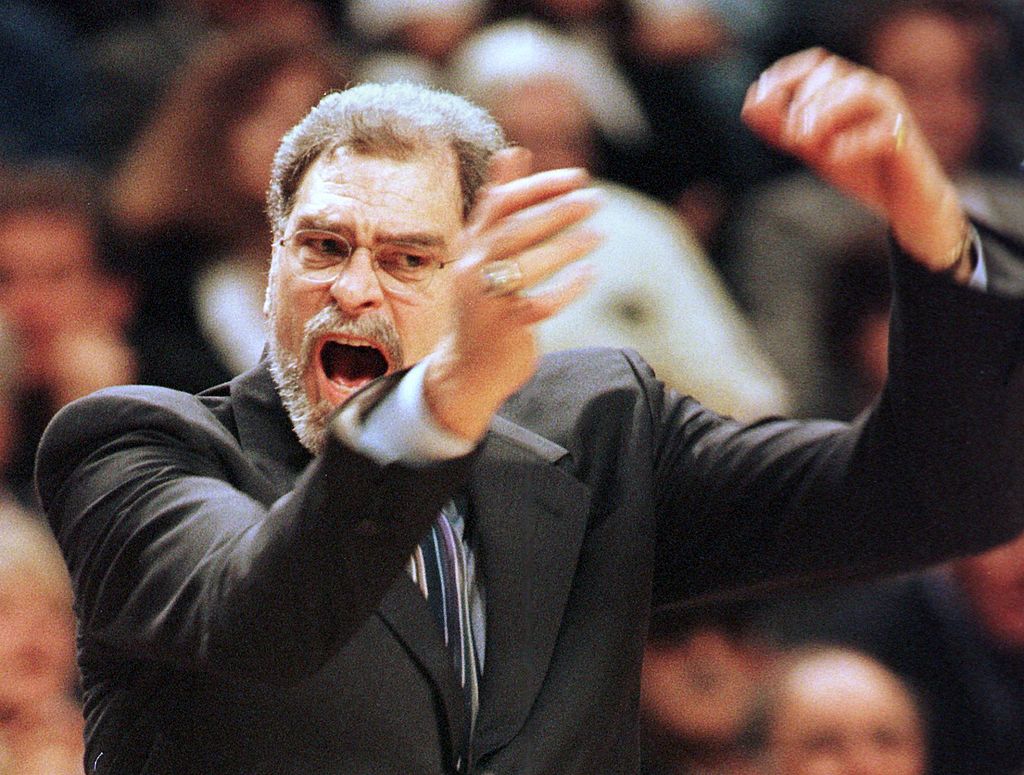NBA
Phil Jackson Wasn't the First Coach to Use the Triangle Offense

While players get most of the credit, coaches can play a major role in a team's failure or success. Coach K, for example, helped transform Duke from a downtrodden basketball program to a national powerhouse. In the NBA, though, few names are bigger than Phil Jackson and his famous triangle offense.
The Zen Master, however, didn't create the triangle. The system had been in use since before Jackson ever picked up a basketball.
Phil Jackson's lengthy basketball career
Growing up in Montana, Phil Jackson was a natural athlete. While he played football, baseball, and threw the discus, he found a home on the basketball court. That talent took him to the University of North Dakota and, eventually, to the NBA.
While Jackson was never a superstar, he spent 12 seasons in the NBA as a role player coming off the bench. When his playing career ended, however, he wasn't done with basketball; he started coaching in the Continental Basketball Association and the Puerto Rican Nationa Superior Basketball league, hoping to get his foot in the door. In 1987, he got that chance, joining the Chicago Bulls as an assistant.
Jackson took ever as head coach in 1989; before long, he had won six NBA championships with Michael Jordan and Scottie Pippen. After falling out with Jerry Krause, the Zen Master headed to Hollywood, where he won five more championships.
Since leaving the sidelines, however, Jackson hasn't found the same level of success. His stint as the president of the New York Knicks ended in disaster; while the franchise is famously dysfunctional, Phil didn't help his own cause.
The origins of Phil Jackson's famous triangle offense
In modern basketball, Phil Jackson is synonymous with the triangle offense, which allowed his various superstars to coexist on the floor. Despite that reality, the Zen Master didn't create the system.
As Dan Barry explained in the New York Times, “the Triangle Offense was born on the hardwood courts of the University of Southern California in the 1940s, the offspring of the university’s innovative basketball coach, Justin McCarthy “Sam” Barry.” The system spread then throughout the basketball world thanks to Tex Winter, a USC player turned coach.
Winter was working with the Bulls when Jackson arrived; after Phil took over, Tex remained on his staff as an assistant. The pair stuck together in Los Angeles, riding the triangle offense to the top of the basketball world.
Can the triangle offense still work in today's NBA?
On paper, the triangle offense seems perfectly suited to the modern NBA. The best teams have two or more superstars; in theory, the system would allow them to coexist. In reality, though, things have been a bit different.
During Jackson's time in New York, the Knicks struggled to use the triangle successfully. While it's easy to say Carmelo Anthony simply didn't fit into the system, there's likely a larger issue at play.
Today's NBA is built around isolation, the pick and roll, and outside shooting. The triangle offense, on the other hand, is more methodical and tends to create scoring opportunities in the post or from the elbow. As analytics have shown, that's an inefficient way to run your offense. There's also a problem on the personnel front, though.
Running the triangle requires both a conventional big man and players who can work together to read a defense and react to what's happening in real-time; even if a team had a back-to-the-basket center, developing that chemistry can be an issue. What happens, for example, if your guard leaves in free agency or your big man rolls his ankle?
Ultimately, the triangle offense parallels Phil Jackson's legacy. While it's hard to argue with their success, those results are impossible to separate from the circumstances. Whether you're talking about winning titles or running a specific offensive scheme, things are a lot easier with either Michael Jordan and Scottie Pippen or Shaquille O'Neal and Kobe Bryant on your roster.











